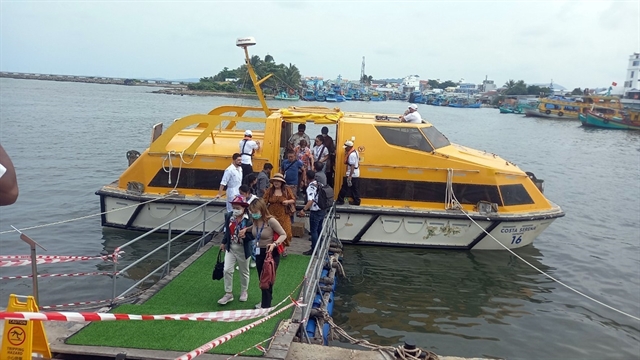 Economy
Economy

 |
| Foreign tourists visit Phú Quốc Island off southern province of Kiên Giang. — VNA/VNS Photo |
HCM CITY — Despite its growth in hospitality options, the infrastructure required to support environmentally and economically sustainable growth on Phú Quốc Island off Kiên Giang Province remains inadequate, according to Savills Hotels.
Since late 2012, improved accessibility and the expansion of flight routes to the island have boosted tourism and hotel development.
According to Savills Hotels statistics, the island has 25,000 accommodation units, most of which are small, locally operated properties. However, 15 per cent of the inventory includes upscale and luxury hotels and resorts.
Compared to regional competitors, Phú Quốc’s accommodation stock is only equal to 27 per cent of the stock in Phuket and 31 per cent of that in Bali.
“Burgeoning tourism has fuelled hospitality real estate growth in Phú Quốc. In the past, many developers rushed to enter without careful planning and execution, with replication of products that disregard market trends, the island's heritage or product identity,” said Mauro Gasparotti, director of Savills Hotels.
“Despite high-quality developments, the lack of central attractions in Phú Quốc reduces its appeal and there are no sound tourism anchors,” Mauro said.
“The oversupply of certain products like shophouses is also a concern. The island is facing the challenge of numerous unoccupied commercial spaces with low traffic, which can negatively impact its vibrancy and create a sense of neglect,” he said.
Domestic visitors accounted for over 85 per cent of the island’s visitors before the pandemic. This strong base of local clientele supported a sound recovery in 2022, and tourist arrivals equalled the 2019 base of 5.1 million.
Phú Quốc has a competitive edge compared to other key tourism destinations in Việt Nam because of its international visa policies. Travellers from all countries can enter the island without a visa, provided that the island is their sole destination.
Ngân Phạm, consultancy manager at Savills Hotels, said, “While the policy provides a competitive advantage for attracting international travellers to the island, limited international routes and flights are barriers to fully leveraging its potential.”
Connectivity is a vital factor in the development of an international destination, and Phú Quốc faces significant obstacles in this matter.
Phuket and Bali are well-established destinations and enjoy excellent international connectivity with frequent and direct flights from major cities such as Singapore, Shanghai, and Hong Kong.
Phú Quốc has fewer direct flight routes and less frequent flights. Phuket offers 150 per cent more daily flights, while Bali has 430 per cent more daily flights compared to Phú Quốc.
Phuket and Bali have stronger links with local transport hubs, boasting significantly more flights to Bangkok and Jakarta. Phuket has 330 flights per week to Bangkok, and Bali has 400 flights per week to Jakarta. Phú Quốc has approximately 160 flights to HCM City and 90 flights to Hà Nội.
“It is worth noting that there are currently no flights from Singapore, which serves as an important transportation hub in Asia. This puts Phú Quốc at a disadvantage when compared to destinations like Phuket and Bali,” Ngân said.
Addressing the challenges of connectivity and infrastructure will be essential for Phú Quốc’s successful transformation into a world-class international destination, according to Mauro. In addition, to affirm its position on the international tourism map, Phú Quốc’s tourism industry must promote itself by utilising communication activities and marketing channels properly and efficiently. — VNS




